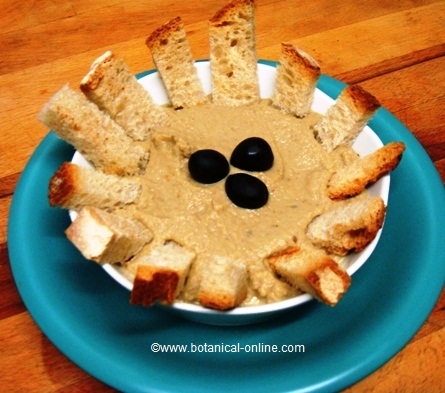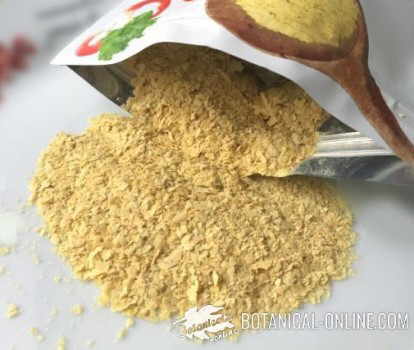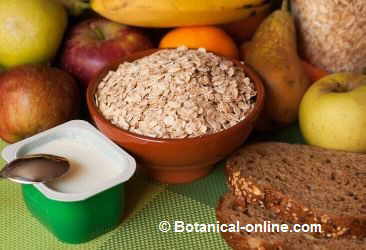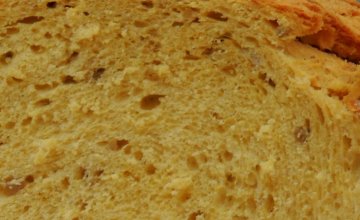Benefits and functions of methionine, essential amino acid
CHARACTERISTICS OF METHIONINE
What is methionine?
Methionine is an essential amino acid that the body can not synthesize and therefore must be provided by the diet.
Methionine has a high content of a chemical element. namely it has high levels of sulfur, beneficial for proper maintenance of some tissues such as nails, skin and hair.
Methionine is also essential for synthesizing two amino acids, cysteine and taurine.
The abbreviation for this amino acid is Met.
Properties of methionine
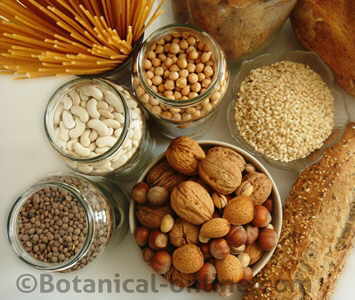 Photo of foods rich in protein in a vegetarian diet.
Photo of foods rich in protein in a vegetarian diet.
Methionine is essential for the formation of proteins and to avoid gaps or muscle or bone fragility. Its use is appropriate in the treatment or prevention of muscular dystrophy, muscle strains, and osteoarthritis.
Its use as a muscle enhancer is widespread among athletes.
What is methionine used for?
- The organism can convert methionine to cysteine, a precursor of a potent antioxidant amino acid, glutathione, which also counteract the damage from free radicals, increasing the life of the antioxidant vitamin E and vitamin C (the body can not get cysteine from methionine, for this reason, methionine is an essential amino).
This amino acid is a good antioxidant, because the sulfur atom is capable of detoxifying and eliminating harmful substances to our bodies (particularly chemicals and heavy metals such as lead and cadmium) as well as the effects caused by free radicals.
- Methionine has also been proven effective in removing toxic components of some medications or medical preparations, like estrogens that provide birth control pills. It is also useful to prevent asthma attacks caused by allergic reactions to foods.
- Minimizes the absorption of some fat, to influence the synthesis of other amino acids such as L-taurine, L-cysteine, L-carnitine.
- Involved in the formation of lecithin in bile secretion and endorphins. By preventing fat deposited in the arteries, methionine is useful in preventing cholesterol, thus avoiding the promotion of cardiovascular diseases such as arteriosclerosis or embolisms.

Methionine helps keep your hair health
- Its use in preventing abnormalities of skin, hair and nails is very outstanding, proving useful in preserving the hair; and the prevention of other diseases of the nails and skin.
- It also controls the body’s histamine levels. Histamine is a substance that accumulates. If excessive, it can generate symptoms of migraine, gastrointestinal discomfort and atopic skin reactions. For this reason, it is very important to eat the required amounts of methionine, since we can minimize the options that our brain does not transmit the right signals, which occurs when histamine accumulates.
- It has also highlighted the role of methionine in preventing mental abnormalities, such as depression, anxiety, stress or schizophrenia.
Contraindications of methionine
– Pregnant women or people suffering from liver and kidney: They should not take supplements of isoleucine.
– Excessive consumption of methionine supplementation has been associated with some heart diseases such as angina and stroke.
Methionine: limiting amino acid in legumes
 Legumes are deficient in methionine, and should be combined with other protein sources for this amino acid and the body to properly take advantage proteins.
Legumes are deficient in methionine, and should be combined with other protein sources for this amino acid and the body to properly take advantage proteins.
Methionine is a limiting amino acid in legumes. That is, legumes contribute with very little protein with the amino acid methionine, insufficient for the organism. This causes the protein not to be properly exploited.
People who follow a vegetarian diet may have heard about the importance of combining plant proteins for producing good quality protein.
All legumes are deficient in the amino acid methionine, That is to say, for optimal nutrition, it is desirable to combine legumes proteins with other proteins rich in methionine.
This combination is possible with cereals and nuts, rich in methionine (but deficient in lysine). It is also compensable by combining vegetable protein with milk or eggs.
| Food | Methionine | Lysine |
Chickpeas | Legumes are deficient in methionine | |
Nuts | Nuts are deficient in lysine | |
Rice | Cereals are deficient in lysine | |
Chickpeas stew with rice | The combination of food causes all amino acids to be provided. |
Foods containing methionine
Animal foods are those that contain more methionine, especially cheese and protein supplements made from milk powder (whey protein)
Within plant foods, we include, for example, sunflower seeds
* More information: Foods rich in methionine
Methionine supplements
Although you can take supplements of methionine, it is recommended to cover the needs of this amino acid through a balanced diet. If supplementation, it is appropriate to consultation a specialist before taking it..
* Related information:
– How to combine vegetable proteins
List of amino acids in food | |
Essential amino acids | Nonessential amino acids |
Phenylalanine, Isoleucine, Leucine, Lysine, Methionine, Threonine, Tryptophan, Valine | Aspartic acid, Glutaminic acid, Alanine, Arginine, Cysteine, Cystine, Glycine, Hydroxyproline, Proline, Serine, Tyrosine |
![]() More information on amino acids.
More information on amino acids.


